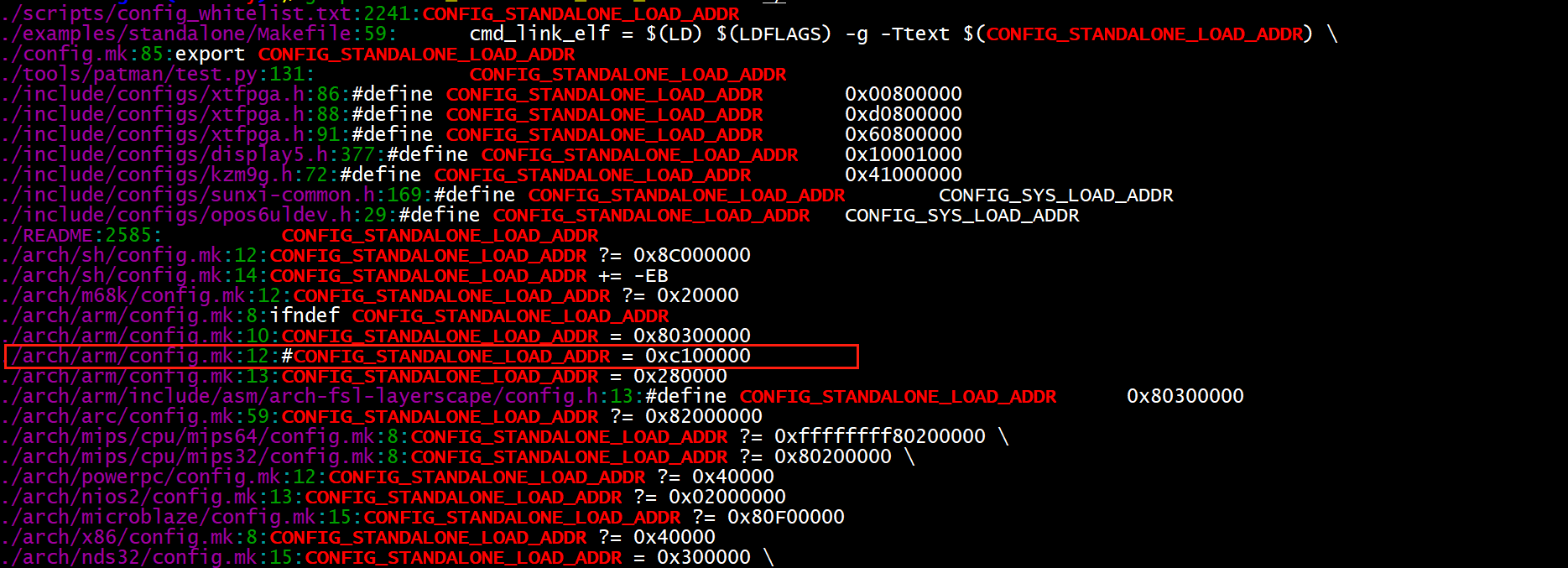uboot引导应用程序
uboot默认是支持执行应用程序的,就像引导内核一样,我们也可以自己写一个应用程序,让uboot启动时引导。
在uboot examples/standalone 目录下,有hello_world.c文件,编译uboot的时候,会自动编译hello_world.bin文件。
裸机程序未加链接地址时,只能使用text代码段,如果裸机程序中使用出现了跨端操作(使用text端段以外的段:rodata,data,bss段),必须在链接时手工指定连接链接地址为实际的运行地址。
默认的链接地址由 Makefile中通过CONFIG_STANDALONE_LOAD_ADDR 指定。

这个地址不一定适合我们的板子,为了不影响uboot的正常运行,我们修改该地址为内核的链接地址0x280000。
重新编译的uboot后,将hello_world.bin通过tftp加载到内存中。
uboot设置好参数。
=> setenv ipaddr 192.168.137.110 => setenv serverip 192.168.137.1 => setenv gatewayip 192.168.137.1 => tftp 0x00280000 hello_world.bin ethernet@fe300000 Waiting for PHY auto negotiation to complete.. done Speed: 1000, full duplex Using ethernet@fe300000 device TFTP from server 192.168.137.1; our IP address is 192.168.137.110 Filename 'hello_world.bin'. Load address: 0x280000 Loading: # 0 Bytes/s done Bytes transferred = 794 (31a hex)
执行go指令去引导我们的程序。
=> go 0x280000 ## Starting application at 0x00280000 ... Example expects ABI version 9 Actual U-Boot ABI version 9 Hello World argc = 1 argv[0] = "0x280000" argv[1] = "<NULL>" Hit any key to exit ...
成功打印出Hello World。
也可以将 go 0x280000 添加到bootcmd 中,每次启动内核前,先去引导应用程序,再引导内核。
https://blog.csdn.net/weixin_45861321/article/details/122459099




【推荐】国内首个AI IDE,深度理解中文开发场景,立即下载体验Trae
【推荐】编程新体验,更懂你的AI,立即体验豆包MarsCode编程助手
【推荐】抖音旗下AI助手豆包,你的智能百科全书,全免费不限次数
【推荐】轻量又高性能的 SSH 工具 IShell:AI 加持,快人一步
· 10年+ .NET Coder 心语 ── 封装的思维:从隐藏、稳定开始理解其本质意义
· 地球OL攻略 —— 某应届生求职总结
· 提示词工程——AI应用必不可少的技术
· Open-Sora 2.0 重磅开源!
· 周边上新:园子的第一款马克杯温暖上架